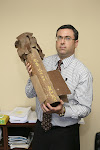In Yefren, high in Libya's Nafusa mountains, a 2000-year-old shul is guarded by Muslims.
It is one of the seven Ghriba - "wondrous" - synagogues of the Maghreb. The most famous, in Djerba, Tunisia, attracts thousands each year to its magnificent 19th century building. By contrast, the tiny ancient Yefren shul is barely visited.
Its quiet simplicity exudes a timeless mystery, a deep holiness. There are beautiful ceiling inscriptions. Six arches and six windows echo the Star of David. Tradition says it contains a stone from the Second Temple itself. And although Yefren's Jews are long gone, now that Gaddafi has fallen their former Muslim neighbours look forward to welcoming them back.
The history of the Jews of Libya is a long book, stretching back to the third century BCE. An important, often thriving community - in 1941 one in four of Tripoli's population were Jews - the recent chapters are darker, including the Italian colonists' antisemitic laws, the Tripoli pogroms of 1945 and 1948, the 1967 exodus, and the Gaddafi regime.
Mohamed Madi, guardian of the Yefren synagogue
Yet a different and precious tale threads through this narrative: the Berbers - who prefer to be called Amazigh, or "free people" - whose culture and language long pre-date Arab colonisation. Thelose friendship between the Amazigh and the Jews lies in a shared, ancient history, a chiaroscuro of joy and persecution.
Mohamed Madi is the latest of three generations who have secured the Yefren shul. His grandfather protected Yefren's Jews with a rifle in 1948. Under Gaddafi, his father secretly tended to the synagogue. The Madis also look after the rabbi's house. Such guardianship, he says, is about "honour and respect for our neighbours, and for their religion".
"We have a very good relationship with the Muslims of Yefren," says Jakov Guetta, grandson of Yefren's last rabbi, now living in Israel. "The Amazigh are special people, good people. They protected the Jewish people from the Nazis in the war. We have had a very good relationship for hundreds of years." He recalls Yefren's Jewish history as one featuring "powerful things, miracles, everything".
David Gerbi escorted his aunt, the last Jew in Libya, to Rome in 2002. Joining the Libyan war, he used his skills as a psychotherapist to help traumatised freedom fighters in Benghazi. He even earned an Amazigh nickname, Udai ugrauli - the Jewish Revolutionary. The Amazigh, a persecuted minority under Gaddafi, played a major role in liberating Libya. Today, says Mr Gerbi, "they need support. These are the people that - if they become strong - they have the right attitude, they want unity."
The Amazigh people stretch from Egypt to the Western Sahara and south to the Niger river. Aspects of their culture, from food to the obligations of hospitality, have infused waves of invaders, including the Romans and the Arabs. Often persecuted, they are just beginning to find their voice in the region. As historical friends and allies of the Jews, it is time to renew that connection - to start writing, perhaps, a new chapter in this long story.

